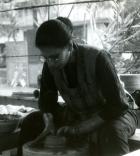For training in scientific techniques for application in archaeological molluscan research, at the University of Cambridge
Custom Search 1
Recipients

Dr Arati Deshpande Mukherjee
Archaeological Molluscan Research

C T Dorji
Caring for Textiles
Research on textiles, including their proper maintenance and display, in UK museums

Kristine Michael
Pioneers of the Indian pottery movement
In this visit I concentrated on the 19th century and used the National Art Library at the V&A and the British Library as well as studying museum and archival collections in Alton, Nottingham, Brighton, Swansea, Stoke-on-Trent, Osborne House etc. On both my two visits to the UK under the auspices of the NTICVA I had a simply charged time, absorbing everything, particularly the intense discussions with the Indian section at the V&A Museum as to how to present objects in a historical framework, and in the wider perspective of a post-colonial setting.

R Balasubramanian
Amaravati marbles: Study and Care
The Government Museum, Chennai holds a very significant collection of sculptures, in particular the sculptures from the Buddhist site of Amaravati. I took up the Fellowship in November 2000 in order to see the collection of Amaravati sculptures in the British Museum and to learn about display and conservation techniques. I learned from the British Museum how they had refurbished the Hotung and Asahi Shimbun galleries. The British Museum has conserved all the Amaravati sculptures and then mounted them on steel frames supported by treated rubber cushions.

Dr Damayanti Datta
Bilingual intelligentsia? Linguistic exchange in 19th Century Bengal
Research on the diffusion of English language and the rise of the bilingual intelligentsia of 19th century Bengal, at the British Library and other UK institutions

Dr Buddha Rashmi Mani
Study of terracotta and clay objects of the Kushan Period (1st to 4th century AD)
I am grateful to the Trust for awarding me the Fellowship to study Kushan terracottas in the museums in the UK at the appropriate time when I was excavating sites such as Kanishkapura and Ambaran (Akhnur) in Jammu and Kashmir related to the Kushan period - particularly the latter which is famous for earlier yields of typical Akhnur Buddhist terracotta heads.
